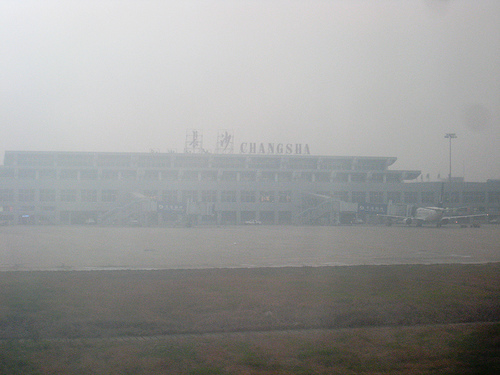In China, Air Pollution Drives Expats Away

As China’s Air Pollution Index (API) reached a world-record high this January, a new trend began to emerge: expatriate workers who had once been attracted to the country’s economic opportunities were starting to leave.
Multinational companies have been impacted in Beijing and Shanghai in particular, China’s two largest industrial hubs – producing a problem previously only experienced by places like Mexico City, formerly known as the world’s dirtiest city. Recruiters said declining job opportunities because of worries over quality of life and food safety, exacerbated by such reports as the more than 6,000 dead pigs dumped in Shanghai’s water supply.
Businessweek reported that Apple, Toyota, Honda and JPMorgan Chase have also started to address the problem by issuing face masks to employees and placing plants inside offices. “Over the next few years the quality of life in Beijing will be something that has an impact on salaries,” said Simon Lance, Shanghai-based regional director at Hays Plc., a company that has previously helped recruit talent for companies such as JPMorgan, Barclays Plc.
Those with children express particular concern. Automobile manufacturer BMW told the Wall Street Journal that international candidates called and withdrew job applications because they “no longer had the support of their families."
The Christian Science Monitor reported on a mother in London, pregnant and about to move to Beijing, who wrote in to parenting website Beijing Mamas saying, “I am freaking out about the pollution in Beijing and how it will affect our lives and our health… I am scared I will feel trapped indoors too afraid to take baby out or find the pollution depressing.” Reports tell of senior executives moving their families to less industrial places such as Vancouver and Finland.
Expats are right to be concerned. In its course to economic prosperity, China has long had a problem with air quality, one that the government aggressively addressed prior to the 2008 Beijing Olympics by restricting traffic and closing a number of factories. It was revealed in April that air pollution was linked to more than 1.2 million premature deaths in China, making it the fourth leading cause of death nationwide.
Pollution levels have literally gone off the U.S. Embassy’s charts since the beginning of the year, constantly measuring 900 on a one-to-500 scale that considers 300 to be “hazardous” and a warning for the public to remain indoors. Photographs regularly surfaced of smog looming over the city, in part to demonstrate safety concerns that the government, until January, were not formally acknowledging in official records.
For their part, officials have since introduced measures to increase air quality, temporarily shutting down more than 100 factories and ordering one-third of government vehicles off the streets. The pollution has grown to such an extent, however, that it was even reported to be visible from outer space.
Dulwich College was the first in Beijing to purchase the $650,000, 18,000 square-foot enclosure, with the International School of Beijing swiftly following suit. Harrow International School of Beijing installed an air filtration system, described by its head of marketing as “the biggest single item of expenditure.”
These high schools, marketing departments and all, can afford to take extra measures to protect their students’ health, many of them charging tuition fees of around $35,000 per year. Given the competitiveness of the international school market, air quality control systems have become a necessary acquisition, particularly in consideration of already apprehensive incoming parents.
There are some 600,000 foreigners living in China, according to the 2010 national census. It is important to note, however, the “bubble” in which expats tend to live, an international enclave of sorts quite literally shown by American-themed neighborhoods and, most recently, domes international schools have begun to install for their outdoor playgrounds.
Domestic workers are also beginning to ask for relocations. Louisa Wong, founder of recruitment firm Bo Le Associates, told the Wall Street Journal: “Those in Beijing want to go to Shanghai, those in Shanghai want to go to Hong Kong, and in Hong Kong they want out.”
For foreigners though, does the problem lie in health concerns alone or does it stem from a feeling of cultural dissonance? From the expat’s point of view, why would one move to a new city where the government has already shown little altruism in protecting its residents? Falsified pollution reports and a clean-up campaign that appeared to end after the Olympics do little to comfort professionals who might have prospects elsewhere – somewhere that doesn’t require a face mask.
Reach Assistant News Editor Michelle Toh here.



